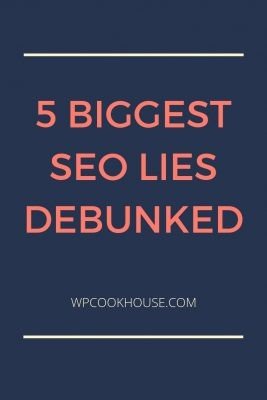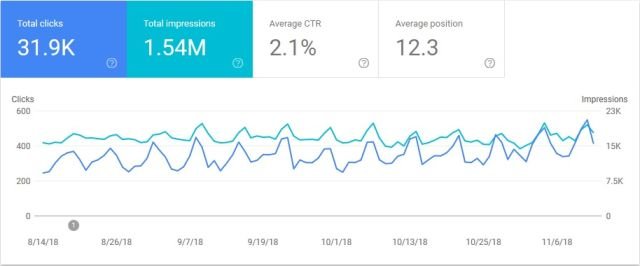SEO is a difficult game, as everybody knows it. Or wait… is it really? I’m sure you’ve heard all the SEO lies below, and I’m pretty sure some of them looked genuine enough to stop you from taking action.
SEO Lie #1: SEO Is Only For Highly Trained Professionals
Although big projects, international targeting or any online business operating several websites do require a professional SEO in order to achieve the best possible results, that’s not a must for most small businesses or blogs.
You can definitely get good rankings, excellent results, visitors and even clients/income with SEO without any specific technical knowledge. Here are a couple of tips you should follow in order to succeed even if you’re not an SEO professional:
- Find and target the topic of your website. Also make sure to stick to it. Don’t try to write about everything. If you have more ideas, simply start another website for another topic.
- Have a strategy. Know what you want to achieve with your website, and how SEO can help you attain that goal.
- Make a thorough keyword research. Repeat this at least every 6 months.
- Target as many keywords as you can. Don’t underestimate the power of low search volume keywords, especially when starting a new website.
- Make sure to follow SEO content writing guidelines.
- Don’t believe anything but try out everything. If you see it working on your website, keep it and tweak it. If you don’t see it working, simply forget it.
- Don’t try to cheat Google. That simply doesn’t work. And yes, it can even harm you if you’re doing it persistently.

SEO Lie #2: Duplication Is Your Enemy
I find most entrepreneurs, bloggers or even online marketers feel intimidated when it comes to content duplication.
You might think duplicate content is something you need to avoid at any cost. Some people even think that just by simply copying one sentence from another website might induce a Google penalty.

In reality, the way Google works is far from it. Of course you should avoid copying other people’s content simply by ethical and legal reasons. And naturally if your website adds nothing to the quality of the internet, no way it will show up in search results.
But wait a minute, quality of the internet is what I’m talking about? That’s pretty low, isn’t it?
And bang, that’s one part of the answer. The general quality of website is so low that even if you’re not publishing the best of all possible publications, you’ve still got room in Google’s house.
And the other part of the answer is that if your content is partly or even entirely duplicated – for ethical reasons I only ever encourage you to copy your own content – but it’s still beneficial for the visitor, you’re good to go.
Let me show you an example here. This is a screenshot of one of my websites, having over 4000 pages that differ only by a few words. That’s what most people not involved in SEO would consider as duplicate content. But because I’m providing useful information for the visitors, Google still appreciates it and it does rank. I think the numbers speak for themselves.

SEO Lie #3: It’s All About Links
Don’t get me wrong, links are still important in SEO. But sometimes you can get the idea that ranking is only about acquiring/building awesome link. Maybe not mistakenly this is originated from link building companies or websites that offer link related services.
In reality you can go a long way by simply working on your content, and of course applying whatever on-site SEO technique and tip you can. One tip though, make sure to promote your content on your social media channels, to your subscribers, and sometimes even with a small amount of PPC ads.
And there are at least two main advantages to this approach:
- If your content is good and you’re promoting it on your own channels, you’ll easily acquire actual organic links without any further ado. And every honest SEO expert will tell you that these links are simply the best.
- An organic link profile is like a shield to your website. You’re almost 100% protected to any link-related changes in the algorithm.
SEO Lie #4: Algorithm Changes Are To Be Afraid Of
Speaking about search algorithm. Yes, you definitely should be afraid of any Google algorithm change if you’re not playing honestly. But let me point out something to you.
There are always 10 positions on page #1 for any given keyword.
What does this mean? Whenever you hear people weeping about loosing rankings due to algorithm changes, there is always someone with equal amount of benefit. Algorithm changes are simply zero sum games. If someone looses 10 positions, there must be another website gaining 10 positions, or 10 websites gaining 1 position etc.
According to my experience, if you follow the outline from SEO lie #1 above, you don’t really have to worry about algorithm changes. These will in fact be beneficial to your website in most cases.

SEO Lie #5: SEO Is A Technical Game
This is basically an alteration of SEO lie #1. It’s just simply not true. SEO is much more about having a startegy, following that strategy and presenting desirable content than simply technical settings.
For bigger websites yes, technicalities might play a bigger role. But here I’m talking about websites with tens of thousands of pages, targeting different countries etc.
In reality, SEO is 80-95% common sense and persistence, and only the rest is technical settings. Furthermore, most technical settings for blogs or small business websites are handled correctly by WordPres themes and a good SEO plugin these days. In general the smaller your project/website is, the less you should worry about technicalities.
How To Get Good SEO Results?
I find the worst thing you can do to your website is not doing anything because being afraid of all these SEO lies. That’s called analysis paralysis. You shouldn’t be doing that. Simply understand that if you don’t try to cheat the system, you can’t do any harm. So whatever you do to your website today, is probably better than just being paralyzed by some lies.
Why don’t you check out my article about the importance of the topic of your website, where I give you several tips on how to start targeting search queries effectively.

